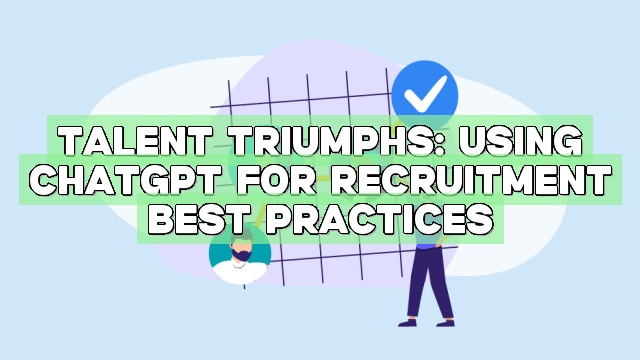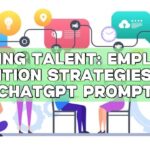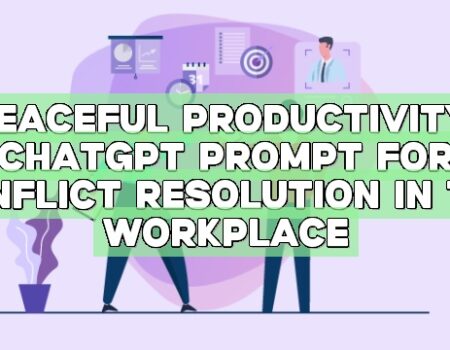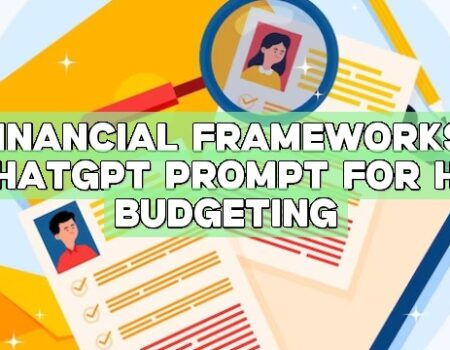As businesses aim to secure the best talents in the industry, recruitment methods have evolved to be more efficient and streamlined. One such innovation is the use of ChatGPT prompts, an AI-powered tool that helps recruiters perform various recruitment tasks accurately. Incorporating ChatGPT prompts into recruitment processes is fast becoming a best practice, as it not only saves time and resources, but also yields more accurate results. In this article, we will explore the advantages and considerations of using ChatGPT prompts for recruitment best practices.
Key Takeaways
- ChatGPT is a powerful tool for recruitment that uses AI to optimize various recruitment tasks.
- By leveraging ChatGPT prompts, recruitment professionals can enhance their candidate screening and evaluation processes.
- Effective prompt examples can be crafted to yield accurate and useful responses from ChatGPT in the context of recruitment.
- ChatGPT can assist in streamlining complex recruitment tasks and aid in interview preparation.
- While there are potential benefits to using ChatGPT in recruitment, ethical considerations must be taken into account.
Understanding ChatGPT: A Powerful Tool for Recruitment
ChatGPT is an advanced natural language processing (NLP) tool that can generate human-like responses from a given prompt. The technology behind ChatGPT is based on deep learning, a subset of machine learning that involves training neural networks with large data sets to perform specific tasks.
In the context of recruitment, ChatGPT can help streamline the hiring process by automating tasks such as candidate screening, evaluation, and interview preparation. Using ChatGPT prompts can also help reduce bias in recruitment by eliminating human subjectivity and providing objective responses based on the data it was trained on.
How ChatGPT Can Benefit Recruitment
One of the key advantages of ChatGPT in recruitment is its ability to analyze numerous resumes in a short amount of time. ChatGPT prompts can be created to screen candidate resumes automatically, saving recruiters hours of work. Additionally, ChatGPT can provide candidate evaluations based on specific criteria, such as skills and experience, making the recruitment process more efficient.
Another benefit of using ChatGPT in recruitment is its ability to simulate candidate responses during the interview process. ChatGPT prompts can generate potential interview questions that can be used to assess a candidate’s knowledge and experience in a specific field. Recruiters can also train ChatGPT to provide responses that simulate candidate responses, allowing them to prepare for interviews more effectively.
Implementing ChatGPT in Recruitment
Integrating ChatGPT into recruitment processes requires some technical expertise. However, there are several companies that offer ChatGPT-based recruitment software that can help automate the process. Recruiters can also create their own ChatGPT prompts using online platforms, such as Hugging Face, which provides pre-trained models that can be fine-tuned for specific tasks.
It’s important to note that ChatGPT should not replace human recruiters entirely. The technology is best utilized in conjunction with human expertise and input. Additionally, recruiters should be mindful of any potential ethical considerations when using ChatGPT, such as the risk of perpetuating biases in the data sets used to train the system.
In summary, ChatGPT is a powerful tool that has the potential to revolutionize recruitment processes. By automating tasks such as candidate screening, evaluation, and interview preparation, ChatGPT can save recruiters time and improve the efficiency of the hiring process. However, it’s important to use ChatGPT responsibly and in conjunction with human expertise to avoid any potential ethical concerns.
Leveraging ChatGPT Prompts for Recruitment Tasks
ChatGPT prompts can be used to perform various recruitment tasks, such as resume screening and candidate evaluation. One of the main advantages of using ChatGPT prompts is that they can save recruiters valuable time by automatically filtering out unsuitable candidates.
ChatGPT prompts can also provide insights into a candidate’s skills and experience. By inputting keywords related to the desired position, ChatGPT can generate a list of relevant skills, experience, and accomplishments. This information can then be used to compare candidates and identify those who are the best fit for the job.
Another use for ChatGPT prompts in recruitment is to evaluate a candidate’s cultural fit. By inputting questions related to company culture and values, ChatGPT can generate responses that give recruiters an idea of how well a candidate aligns with the organization.
| Recruitment Task | ChatGPT Prompt Examples |
|---|---|
| Resume Screening | “What is the candidate’s experience with [specific skill]?” |
| Candidate Evaluation | “What are the candidate’s strengths and weaknesses?” |
| Cultural Fit Assessment | “How would the candidate describe their work style?” |
ChatGPT prompts can also be used to personalize the recruitment process for candidates. By generating questions tailored to each candidate’s individual background and experience, recruiters can create a more engaging and meaningful experience for job seekers.
In summary, ChatGPT prompts can be a valuable tool for recruiters looking to optimize their recruitment process. By using ChatGPT prompts to perform various recruitment tasks, recruiters can save time, gain insights into a candidate’s skills and experience, evaluate cultural fit, and personalize the recruitment process for candidates.
Crafting Effective Prompt Examples for Recruitment
Creating prompt examples that yield accurate and useful responses from ChatGPT is crucial for optimizing recruitment strategies. Here are some tips for crafting effective prompt examples:
- Be clear and concise: Use simple language and avoid unnecessary jargon to ensure ChatGPT can easily understand the prompt. Use bullet points or numbered lists to break down complex information.
- Include relevant keywords: Incorporating relevant keywords into the prompt can help ChatGPT identify essential information and provide accurate responses.
- Be specific: Provide context and background information to help ChatGPT understand the prompt better. This also helps to ensure the prompt is relevant and specific to the task at hand.
- Focus on open-ended questions: Avoid closed-ended questions that can result in one-word or short answers. Instead, use open-ended questions that allow ChatGPT to provide detailed and insightful responses.
- Test the prompt: Before using the prompt for recruitment, test it to ensure it yields accurate and useful responses from ChatGPT.
By following these tips, you can create prompt examples that optimize recruitment tasks such as resume screening and candidate evaluation, resulting in more efficient and effective talent acquisition.
ChatGPT Prompt Responses for Screening Applicants
Screening job applicants is a time-consuming process that requires careful consideration of resumes and cover letters. However, with ChatGPT prompts, recruiters can optimize their screening process and quickly identify top candidates.
One example of a useful ChatGPT prompt for screening candidates is:
“What relevant experience do you have for this position?”
This prompt can help recruiters quickly evaluate a candidate’s experience and qualifications. Additionally, it allows the candidate to provide a more detailed response which can help them stand out in the screening process.
Another helpful ChatGPT prompt for screening is:
“What motivates you to apply for this position?”
This prompt enables recruiters to understand a candidate’s interest in the position and the company, as well as their overall motivation for applying. Recruiters can also use this prompt to gauge a candidate’s communication skills and assess whether they have a strong understanding of the position’s requirements.
Overall, ChatGPT prompts can be a valuable tool for recruiters looking to streamline their screening process and identify the best candidates efficiently. By incorporating well-crafted prompts into their recruitment strategies, recruiters can save time and effort while still identifying top talent.
Enhancing Candidate Evaluation with ChatGPT Prompts
While ChatGPT prompts can be used for various recruitment tasks, they hold particular value when it comes to candidate evaluation. With its advanced language processing capabilities, ChatGPT can help recruiters assess the skills, experience, and cultural fit of job candidates in a more efficient and objective manner.
One of the most effective ways to use ChatGPT prompts for candidate evaluation is by posing open-ended questions that reveal candidates’ critical thinking and problem-solving abilities. For example, asking “How would you approach a complex project with competing priorities?” can generate a wealth of information from candidates on their project management skills, ability to work under pressure, and communication style.
Another way to utilize ChatGPT prompts for candidate evaluation is by providing background scenarios and asking candidates how they would respond in certain situations. This approach can be particularly useful for assessing soft skills and cultural fit. For example, a prompt asking “How would you handle a team conflict between two members with different work styles?” can provide insights into a candidate’s leadership style, conflict resolution abilities, and teamwork approach.
Using ChatGPT Prompts for Skill Assessment
Besides evaluating candidates’ soft skills and cultural fit, ChatGPT prompts can also help recruiters assess technical skills. By using specific prompts that target a particular skill or knowledge area, recruiters can gauge candidates’ proficiency in various competencies, such as programming languages, data analysis tools, or industry-specific regulations. For example, a prompt asking “How would you optimize a website’s loading speed?” can provide insights into a candidate’s web development skills, while a prompt asking “How would you analyze a sales report to identify trends and insights?” can reveal a candidate’s data analytics abilities.
However, it’s important to note that while ChatGPT prompts can provide valuable information on candidates’ skills and abilities, they should not be the sole basis for decision-making. Recruiters should still rely on their expertise and judgment to assess candidates’ suitability for a role, taking into account other factors such as a candidate’s work history, references, and interview performance.
Using ChatGPT Prompts for Interview Preparation
Interviewing job candidates is a crucial part of the recruitment process. However, preparing for an interview can be time-consuming and require significant effort. ChatGPT prompts can assist in this task by generating interview questions and simulating candidate responses.
By providing ChatGPT with relevant information about the job position and company, it can develop tailored questions to ask during an interview. This not only saves time but also ensures that all candidates are asked the same questions, creating a fair and equal interview process.
Moreover, ChatGPT can simulate candidate responses, giving interviewers the opportunity to prepare for potential answers and counter questions. This can help streamline the interview process and make it more effective in assessing the suitability of job candidates.
To get the most out of ChatGPT in interview preparation, it is necessary to provide it with sufficient information about the job position and company, as well as the key competencies required. This will help generate relevant and insightful questions that will aid in accurately evaluating candidates.
In summary, using ChatGPT prompts for interview preparation can help streamline the process, ensure fairness, and enhance the evaluation of job candidates.
Breaking Down Complex Recruitment Tasks with ChatGPT
ChatGPT prompts are incredibly useful when it comes to streamlining and optimizing recruitment tasks, particularly for complex hiring processes. By providing ChatGPT with more detailed information and context, it can provide more precise and accurate responses.
Longer Prompts
For complex recruitment tasks, consider feeding ChatGPT with longer prompts that provide additional information and context. This will help the tool understand the task at hand and provide more accurate responses. Longer prompts give ChatGPT a better understanding of the larger picture, allowing it to provide more logical and relevant responses.
Additional Background Information
Incorporating comprehensive background information can make a significant difference in the quality of responses generated by ChatGPT. The tool can use contextual information to understand the broader context of the task. By understanding the context better, ChatGPT can provide more insightful responses, making the recruitment process more efficient and effective.
| PRO TIP: | When using longer prompts, ensure that they are structured in a way that conveys the most critical information first, followed by less critical information. This structure will help ChatGPT process the most important details faster, allowing it to provide faster and more accurate responses. |
|---|
Overall, utilizing longer prompts and providing additional background information can help break down complex recruitment tasks and make the process more efficient. It allows ChatGPT to generate more precise responses while minimizing the need for human intervention. This results in faster recruitment processes that yield better results.
Advantages and Considerations of ChatGPT in Recruitment
Integrating ChatGPT into recruitment processes presents various advantages and potential challenges that employers should be aware of when considering the tool for their talent acquisition strategies. The following are some of the benefits and considerations to keep in mind:
Advantages of ChatGPT in Recruitment
1. Time and cost savings: ChatGPT can automate and streamline time-consuming tasks in recruitment, such as screening and candidate evaluation, resulting in significant savings in time and resources.
2. Improved efficiency: ChatGPT can handle multiple tasks simultaneously, enabling employers to process large volumes of applications and identify the most suitable candidates more efficiently.
3. Impartiality: ChatGPT responses are based on data and algorithms, eliminating conscious or unconscious biases that may influence human decision-making processes.
Considerations when Using ChatGPT in Recruitment
1. Ethical considerations: The use of ChatGPT in recruitment raises ethical concerns regarding privacy, bias, and potential misuse of technology.
2. Limited expertise: ChatGPT is not a substitute for human expertise, and may not be appropriate for evaluating candidates’ soft skills, such as emotional intelligence or communication abilities.
3. Quality of data: ChatGPT relies on the quality of data fed into the tool, and may not provide accurate results if the data is incomplete or biased.
| Advantages | Considerations |
|---|---|
| Saves time and cost | Raises ethical concerns |
| Improves efficiency | Limited expertise |
| Impartiality | Quality of data |
Employers should weigh the advantages and considerations before deciding whether to use ChatGPT in their recruitment processes. While ChatGPT can enhance talent acquisition by optimizing various tasks, it is important to balance it with human oversight and standard recruitment practices.
Summary: Elevating Talent Acquisition with ChatGPT Prompts
Incorporating ChatGPT prompts into recruitment best practices can be a game-changer for talent acquisition. By utilizing this powerful tool, employers can streamline their recruitment process, improve the quality of candidate evaluations, and gain a competitive edge in the job market. ChatGPT prompts can be used for various recruitment tasks, including resume screening, candidate evaluation, and interview preparation.
The benefits of ChatGPT prompts in recruitment include their ability to break down complex tasks, provide diverse perspectives, and reduce human bias. However, it is essential to consider ethical considerations when implementing this technology, such as data privacy and algorithmic biases.
Overall, ChatGPT prompts are an innovative and effective way to optimize recruitment practices, enhance candidate evaluations, and elevate talent acquisition. By using this tool to its full potential, employers can identify top candidates faster and more efficiently, ultimately leading to better hires and stronger teams.
FAQ
Q: What is ChatGPT?
A: ChatGPT is a powerful language model developed by OpenAI that uses natural language processing to generate human-like responses based on given prompts.
Q: How can ChatGPT be used in recruitment?
A: ChatGPT can be utilized in various recruitment tasks, such as resume screening, candidate evaluation, interview preparation, and tackling complex recruitment tasks.
Q: What are ChatGPT prompts?
A: ChatGPT prompts are the input text provided to the model to generate responses. They typically contain questions, instructions, or context to guide the model’s output.
Q: Are ChatGPT prompt responses reliable for screening applicants?
A: ChatGPT prompt responses can aid in screening applicants, but it’s important to review and verify the generated content for accuracy and contextual understanding.
Q: Can ChatGPT prompts simulate candidate responses during interviews?
A: Yes, ChatGPT prompts can be used to simulate candidate responses, helping recruiters prepare for interviews and generate interview questions.
Q: What are the advantages of using ChatGPT prompts in recruitment?
A: Using ChatGPT prompts in recruitment can help streamline tasks, save time, and provide additional insights. It enables recruiters to handle complex tasks more efficiently and effectively.
Q: What considerations should be taken into account when using ChatGPT in recruitment?
A: While ChatGPT is a powerful tool, it’s important to be aware of potential biases, ethical concerns, and limitations associated with automated decision-making. Human oversight and verification are essential.
Q: How can ChatGPT elevate talent acquisition?
A: By leveraging ChatGPT prompts, recruiters can optimize their recruitment strategies, improve the efficiency of various tasks, and enhance the overall talent acquisition process.









